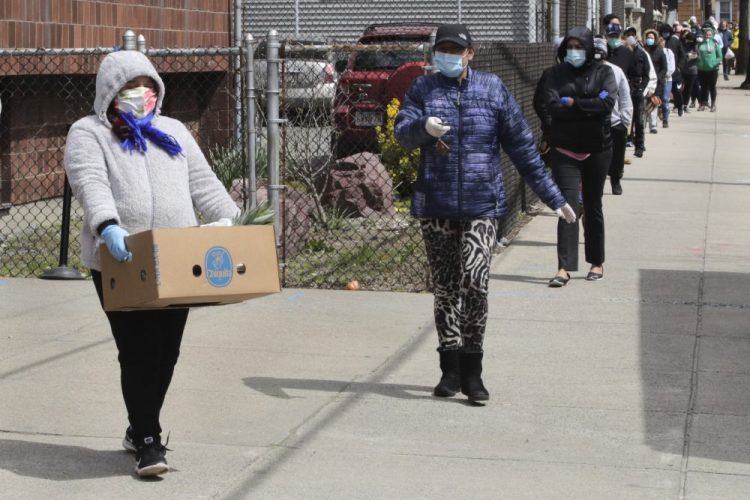CHELSEA, Mass. — In the Massachusetts community hit hardest by the coronavirus, many immigrants make enough money just to get by even in the best economic times. Now, those in the densely populated Boston suburb of Chelsea are struggling to feed their families as the virus spreads around them, and some don’t qualify for government aid because they’re living in the country illegally.
“These aren’t people who can rely upon a stimulus check from the federal government,” City Manager Thomas Ambrosino said. “They don’t have a Social Security number, they haven’t paid taxes, they are surviving on the margins of society, and right now they are being left behind by whatever government support is out there.”
Chelsea, with more than 40,000 people living in just about 2 square miles, is the epicenter of the COVID-19 pandemic in Massachusetts, with a rate of infection nearly four times the statewide rate, as of last week.
The city reported nearly 1,000 cases as of Tuesday, and more than 80 people have died. Across the state, nearly 2,000 deaths and more than 41,000 cases have been reported.
Many Americans are receiving $1,200 checks from the federal government’s stimulus package, and others who are unemployed are getting an additional $600 a week. But people who are living in the country illegally aren’t eligible for that money.
California is filling the gap by spending $75 million of taxpayer money to create a Disaster Relief Fund for people who are living in the country illegally.
Located just across the Mystic River from Boston, Chelsea is more than 60 percent Latino, with more than one-third of the residents hailing from Central America, mostly from El Salvador, Honduras and Guatemala.
Many residents are living in the U.S. illegally and in crowded housing, where it is impossible to remain isolated, Ambrosino said. Many are still relying on public transportation to get to essential jobs, like at grocery stores and food manufacturing plants, while others, like restaurant workers, have seen their jobs evaporate.
“People are hungry. People don’t have housing,” said Gladys Vega, executive director of the Chelsea Collaborative, a community advocacy group. “We’re ground zero right now,” she said.
On Tuesday, hundreds of people waited in line that stretched twice around the block to pick up food being handed out by Vega’s group. The Chelsea Collaborative is helping to process at least 125 unemployment applications a day and delivering food and other supplies to people with COVID-19 who cannot leave their homes, she said. Vega said she realizes everyone in her organization is risking their lives by stepping up to help the needy in their community.
“This whole keeping distancing is very hard for us because we’re a very warm community. I would tell you that we have shed a lot of tears,” she said.
For most people, the new coronavirus causes mild or moderate symptoms, such as fever and cough that clear up in two to three weeks. For some, especially older adults and people with underlying health problems, it can cause more severe illness, including pneumonia, and death.
Ambrosino said the city has received a lot of support from the state, but he fears it will be impossible to undo the economic devastation for many families.
“We are going to do our best to meet the need but the needs are overwhelming,” Ambrosino said. “Unless the governor is going to show up with an 18-wheeler filled with 100 dollar bills every morning, I’m not sure we could meet the need.”
Comments are not available on this story.
Send questions/comments to the editors.


